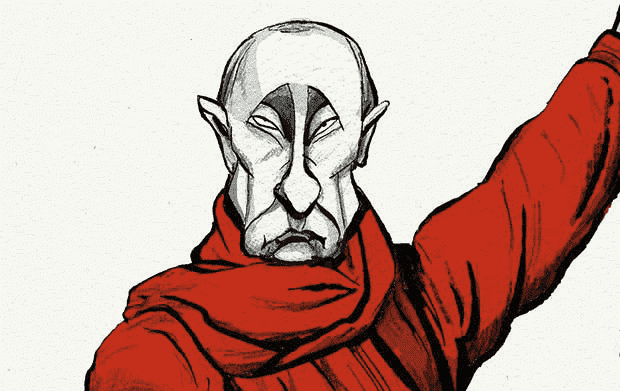One might not think that J. R. R. Tolkien has much to do with the bitter war in Ukraine, but one would be wrong. A particular epithet, once used by Ukrainians specifically for the Russian soldiers who have shelled, looted and raped their way into their country has begun to be applied also to the Russians who support the war and, increasingly, all Russians.
That epithet is orc, the brutal and brutish foot soldiers of the dark lord Sauron, who spill in their countless numbers from the land of Mordor to kill and to despoil.
Tolkien’s works are very popular in both Russia and Ukraine, and there as elsewhere have been subjected to scholarly deconstruction, naked plagiarism and appropriation into memes. Indeed, even before the Ukrainians were calling Russia Mordor, the term was used by Russians embittered by the failure of the so-called Bolotnaya protests against Vladimir Putin’s return to power in 2011-12. Their message was implicitly not only that Putin could be compared with Sauron but also that the country that they felt had failed to support them was now little more than his barren realm.
After Moscow’s annexation of Crimea and intervention into the Donbas, instead the focus shifted. In 2015, Ukraine’s then-president, Petro Poroshenko called the occupied regions of Donbas and the notional new land of ‘Novorossia’ which Russian nationalists wanted declared, Mordor.
Most Russians in Russia do not know what is really happening in Ukraine
The subversively imaginative information warfare Ukrainians are now deploying against Russia – a far cry from Moscow’s plodding or frothing propagandists – was foreshadowed when, next year, Google’s translation tool was hacked: any attempt to translate ‘Russia’ into Ukrainian yielded ‘Mordor’.
With the February invasion, though, the focus has shifted from the country to the people, and especially the soldiers ravaging the country. Calling the Russian invaders orcs quickly became commonplace. This has even worked its way up to the government. When Russian forces were pushed back from Sumy, the local governor, Dmytro Jyvytsky, proudly announced that it was now ‘free of Orcs.’ Even Ukrainian defence ministry statements from time to time use the word.
To denigrate one’s enemies in war is a long-established and hardly surprising tradition, although rarely do the slurs draw on fantasy fiction. Indeed, it is not as though Russians and Ukrainians did not already have a rich lexicon of mutual epithets.
Yet in Tolkien’s cosmology, orcs are debased creatures, mutated from the fair and noble elves into beasts interested in nothing but violence and pain. There is no sense of any redemptive potential and, indeed, two characters in ‘The Lord of the Rings’, the dwarf Gimli and elf Legolas, engage in a jolly contest to see who can kill more of them.
Of course, there is a danger in trying to deconstruct specific epithets too far. Especially given the case that Russian scholar and writer Kirill Yeskov’s ‘The Last Ringbearer’, written in 1999, flips the original story into a struggle by an enlightened constitutional Mordor about to enter its industrial revolution, assailed by the fascistic elves determined to retain the hegemonic rule of magic. ‘Orc’ is just a slur the elves use against the Mordorian (human) soldiers. Arguably, those who live by the fan-fiction, died by it, too.
Yet underlying the orcish controversy is a wider issue. One striking aspect of this war has been the extent to which is is being framed as a civilisational one in which all Russians are required either to make a stand – against, let us remember, a regime that has no problems victimising not just its critics but their families and associates – or be regarded as Putin’s enthusiastic supporters.
Hence the spectacle of artists and sportspeople being required make some kind of ‘disloyalty pledge’ if they want to perform. Hence the calls for Russians to be forced to feel shame for what has been done in their name in Ukraine. And hence the extraordinarily presumptuous calls by a collection of emigre groups that Russians abroad ought to be eligible, if they make the right public declarations, to receive a document confirming them as ‘good Russians’
The tragic irony, is that this is just a (magic?) mirror image of Putin’s own view that this is an existential challenge to Russia, and all Russians must decide: are they patriots, or are they traitors?
Of course, the Ukrainians will use whatever terms they want against those despoiling their lands, and certainly those Russian soldiers’ behaviours are worthy of an orc.
Most Russians in Russia do not know what is really happening in Ukraine, though, and those who have been protesting have been arrested and beaten. Once, to be sure, they supported Putin, but it is a long time since there has been anything like a free and fair election there. As for Russians abroad, they have already made their choice about where they see their future.
The more we turn this war into a moral judgement of all Russians, and the more we vilify Russians as a nation of mini-Putins, the more we actually reinforce the Kremlin’s own last, desperate legitimating narrative, to claim that the West simply hates Russia. Do we really want to do the job of Putin’s propagandists for them?







Comments